Qing Tan
Impression Allocation and Policy Search in Display Advertising
Mar 11, 2022
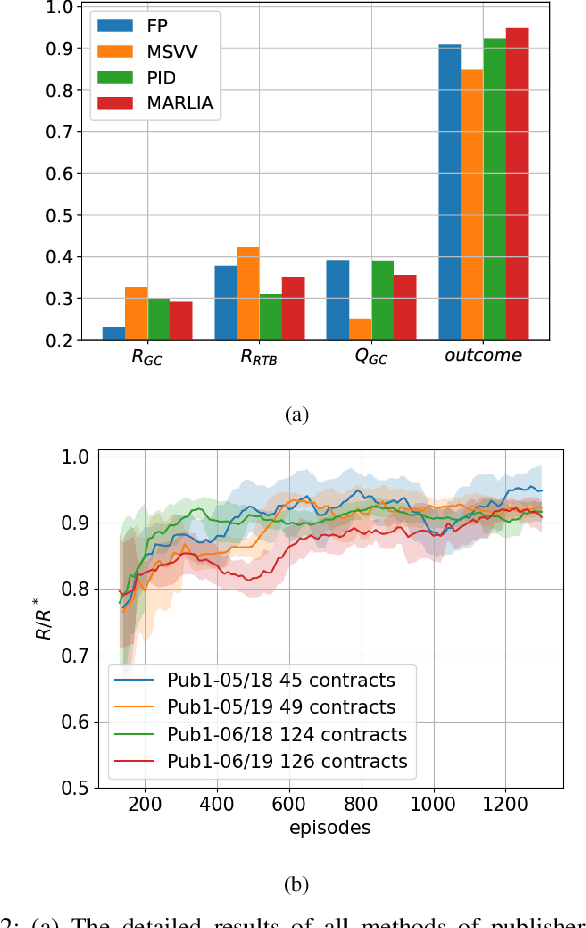

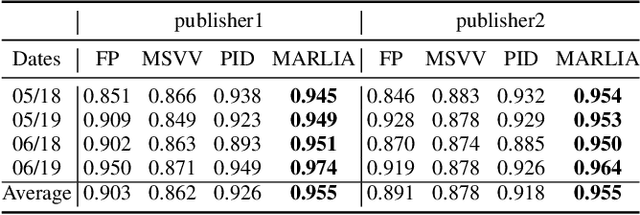
Abstract:In online display advertising, guaranteed contracts and real-time bidding (RTB) are two major ways to sell impressions for a publisher. For large publishers, simultaneously selling impressions through both guaranteed contracts and in-house RTB has become a popular choice. Generally speaking, a publisher needs to derive an impression allocation strategy between guaranteed contracts and RTB to maximize its overall outcome (e.g., revenue and/or impression quality). However, deriving the optimal strategy is not a trivial task, e.g., the strategy should encourage incentive compatibility in RTB and tackle common challenges in real-world applications such as unstable traffic patterns (e.g., impression volume and bid landscape changing). In this paper, we formulate impression allocation as an auction problem where each guaranteed contract submits virtual bids for individual impressions. With this formulation, we derive the optimal bidding functions for the guaranteed contracts, which result in the optimal impression allocation. In order to address the unstable traffic pattern challenge and achieve the optimal overall outcome, we propose a multi-agent reinforcement learning method to adjust the bids from each guaranteed contract, which is simple, converging efficiently and scalable. The experiments conducted on real-world datasets demonstrate the effectiveness of our method.
A Unified Framework for Campaign Performance Forecasting in Online Display Advertising
Feb 24, 2022



Abstract:Advertisers usually enjoy the flexibility to choose criteria like target audience, geographic area and bid price when planning an campaign for online display advertising, while they lack forecast information on campaign performance to optimize delivery strategies in advance, resulting in a waste of labour and budget for feedback adjustments. In this paper, we aim to forecast key performance indicators for new campaigns given any certain criteria. Interpretable and accurate results could enable advertisers to manage and optimize their campaign criteria. There are several challenges for this very task. First, platforms usually offer advertisers various criteria when they plan an advertising campaign, it is difficult to estimate campaign performance unifiedly because of the great difference among bidding types. Furthermore, complex strategies applied in bidding system bring great fluctuation on campaign performance, making estimation accuracy an extremely tough problem. To address above challenges, we propose a novel Campaign Performance Forecasting framework, which firstly reproduces campaign performance on historical logs under various bidding types with a unified replay algorithm, in which essential auction processes like match and rank are replayed, ensuring the interpretability on forecast results. Then, we innovatively introduce a multi-task learning method to calibrate the deviation of estimation brought by hard-to-reproduce bidding strategies in replay. The method captures mixture calibration patterns among related forecast indicators to map the estimated results to the true ones, improving both accuracy and efficiency significantly. Experiment results on a dataset from Taobao.com demonstrate that the proposed framework significantly outperforms other baselines by a large margin, and an online A/B test verifies its effectiveness in the real world.
Computation Resource Allocation Solution in Recommender Systems
Mar 03, 2021



Abstract:Recommender systems rely heavily on increasing computation resources to improve their business goal. By deploying computation-intensive models and algorithms, these systems are able to inference user interests and exhibit certain ads or commodities from the candidate set to maximize their business goals. However, such systems are facing two challenges in achieving their goals. On the one hand, facing massive online requests, computation-intensive models and algorithms are pushing their computation resources to the limit. On the other hand, the response time of these systems is strictly limited to a short period, e.g. 300 milliseconds in our real system, which is also being exhausted by the increasingly complex models and algorithms. In this paper, we propose the computation resource allocation solution (CRAS) that maximizes the business goal with limited computation resources and response time. We comprehensively illustrate the problem and formulate such a problem as an optimization problem with multiple constraints, which could be broken down into independent sub-problems. To solve the sub-problems, we propose the revenue function to facilitate the theoretical analysis, and obtain the optimal computation resource allocation strategy. To address the applicability issues, we devise the feedback control system to help our strategy constantly adapt to the changing online environment. The effectiveness of our method is verified by extensive experiments based on the real dataset from Taobao.com. We also deploy our method in the display advertising system of Alibaba. The online results show that our computation resource allocation solution achieves significant business goal improvement without any increment of computation cost, which demonstrates the efficacy of our method in real industrial practice.
Budget Constrained Bidding by Model-free Reinforcement Learning in Display Advertising
Oct 23, 2018

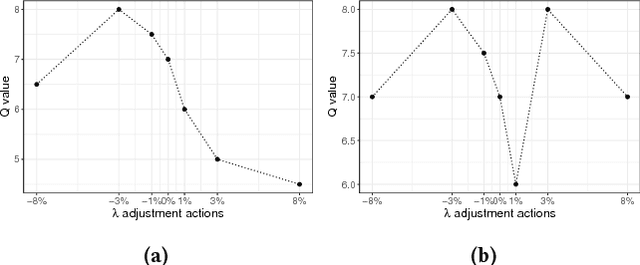
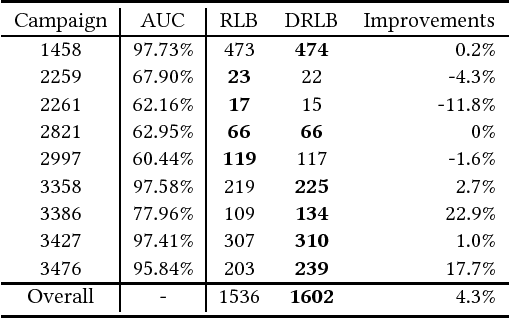
Abstract:Real-time bidding (RTB) is an important mechanism in online display advertising, where a proper bid for each page view plays an essential role for good marketing results. Budget constrained bidding is a typical scenario in RTB where the advertisers hope to maximize the total value of the winning impressions under a pre-set budget constraint. However, the optimal bidding strategy is hard to be derived due to the complexity and volatility of the auction environment. To address these challenges, in this paper, we formulate budget constrained bidding as a Markov Decision Process and propose a model-free reinforcement learning framework to resolve the optimization problem. Our analysis shows that the immediate reward from environment is misleading under a critical resource constraint. Therefore, we innovate a reward function design methodology for the reinforcement learning problems with constraints. Based on the new reward design, we employ a deep neural network to learn the appropriate reward so that the optimal policy can be learned effectively. Different from the prior model-based work, which suffers from the scalability problem, our framework is easy to be deployed in large-scale industrial applications. The experimental evaluations demonstrate the effectiveness of our framework on large-scale real datasets.
A Multi-Agent Reinforcement Learning Method for Impression Allocation in Online Display Advertising
Sep 10, 2018

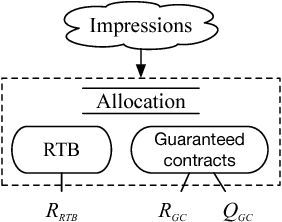

Abstract:In online display advertising, guaranteed contracts and real-time bidding (RTB) are two major ways to sell impressions for a publisher. Despite the increasing popularity of RTB, there is still half of online display advertising revenue generated from guaranteed contracts. Therefore, simultaneously selling impressions through both guaranteed contracts and RTB is a straightforward choice for a publisher to maximize its yield. However, deriving the optimal strategy to allocate impressions is not a trivial task, especially when the environment is unstable in real-world applications. In this paper, we formulate the impression allocation problem as an auction problem where each contract can submit virtual bids for individual impressions. With this formulation, we derive the optimal impression allocation strategy by solving the optimal bidding functions for contracts. Since the bids from contracts are decided by the publisher, we propose a multi-agent reinforcement learning (MARL) approach to derive cooperative policies for the publisher to maximize its yield in an unstable environment. The proposed approach also resolves the common challenges in MARL such as input dimension explosion, reward credit assignment, and non-stationary environment. Experimental evaluations on large-scale real datasets demonstrate the effectiveness of our approach.
 Add to Chrome
Add to Chrome Add to Firefox
Add to Firefox Add to Edge
Add to Edge